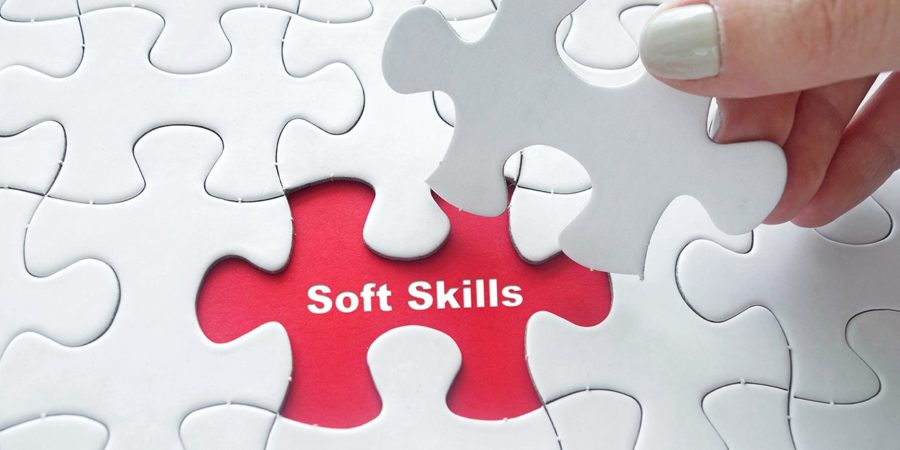interactive
HOW TO IMPROVE YOUR SOFT SKILLS
IN THE WORKPLACE

Everyone uses soft skills in the workplace, whether they realize it or not. Soft skills help us communicate with others and achieve goals as a team.
Regardless of your role in your organization, you can refine and build your soft skills to increase efficiency and improve your professional relationships. But these skills are notoriously difficult to track and quantify, inhibiting your ability to assess and improve your soft skills over time. New technology allows you to review your skillset using real-life simulations that require strategic thinking, problem-solving, and conflict resolution.
What Are Soft Skills in the Workplace?
Soft skills refer to a person’s emotional intelligence and the nature of interpersonal relationships. They are the opposite of hard skills, demonstrating a person’s technical proficiency with a specific program or task. Soft skills often start where hard skills end. Employees do not complete tasks in a vacuum. They must communicate with their colleagues and clients to produce the best work. They also need to advocate for their needs in the workplace without infringing on the rights of others. Soft skills are the difference between hearing and listening. Hearing is simply absorbing the stimuli, while listening means paying attention to what the person is saying, including asking follow-up questions.
Workers at all levels of the organization utilize soft skills when cooperating with others and managing their resources throughout the day. However, the term “soft skills” can refer to various traits depending on the nature of the job at hand.
Regarding leadership positions, managers must set a good example for their employees. Workers often look to managers and executives when setting their behavior in the workplace. They should strive to motivate others to do their best work and treat everyone in the organization equally.
It is also up to the manager or executive to instill the importance of soft skills in the team. This means taking the time to empathize with coworkers and allowing others to express themselves without fear of judgment. They should value personal relationships and teamwork as much as they do hard skills and tangible results to create a positive workplace culture.
Employees may demonstrate different soft skills than those used by managers. They will often be on the receiving end of feedback and will need to demonstrate their ability to improve over time. Their success depends on how their colleagues receive them, not just the quality of the work they produce. Individuals will also need to be accountable for their mistakes on the job instead of assigning blame to others. Even if workers have limited engagement with their teammates or clients, they still utilize soft skills when managing their time throughout the day. Soft skills can also refer to the person’s initiative on the job or the amount of time they spend getting to know a person while doing business.
These skills are not exclusive to a particular type of role. Everyone in the organization can use these skills even when they are not required. Managers can showcase their soft skills by taking their workers’ feedback and implementing their suggestions when appropriate. Employees can also show their leadership skills by encouraging others and taking the time to solve problems outside of their work.
Examples of soft skills in the workplace can include:
-
- Leadership
- Accountability
- Active listening
- Problem-solving
- Adaptability
- Conflict resolution
- Time management
- Cooperation
- Lack of bias
Why Are Soft Skills Important in the Workplace?
Soft skills have always played an essential role in the workplace, but hiring managers are paying more attention to these skills amid increased competition in the job market. Managers can assess each person’s soft skills to find the best candidate for a job beyond what’s listed on their resume. There may be thousands of qualified candidates applying for the same position, but only some will be better suited to work at the company based on their personality traits and ability to interact with others.
Everyone in the organization must possess soft skills to accomplish goals as a team. For every person completing a task, someone depends on their work. Each person has their own needs and wants. If someone is unhappy in the workplace, the parties involved must work out an equitable solution. The nature of these relationships will determine the organization’s potential for success. Poor soft skills can lead to high turnover rates, loss of knowledge and experience, and declining workplace efficiency. Employees will not feel motivated to go above and beyond at work unless they have the support they need from their colleagues and supervisors.
The company will also need to grow and evolve, so soft skills are crucial for success. Employees and managers should be able to adapt as these changes take effect, whether using a new platform to communicate or working remotely in the face of a deadly pandemic.
How to Improve Soft Skills in the Workplace
It’s false to suggest that soft skills aren’t teachable. Workers and managers can use various tools to review and improve their soft skills. Evaluating these traits is more complicated than assessing a person’s hard skills, but progress is possible under the right circumstances.
Whether you want to develop your soft skills or your employees, use these guidelines to improve the learning process.
- Focus on Specific Areas of Improvement
Identify which soft skills need the most attention. Since each person may bring different skills to the table, the training program should be tailored to address individual needs. Workers also learn in different ways. Some require more visual elements, while others may prefer to learn by experience. Many soft skill training materials are one size fits all, giving participants a general overview of the subject. Each person should be free to explore the topics relevant to their own experience.
Our soft skill training program uses artificial intelligence to identify each person’s unique skill set. The program will pick up on specific details regarding how they communicate, such as their body language and tone of voice, to help the person understand how they come across to others. This gives the participant a detailed overview of their performance to improve their skills independently.
Most organizations do not have access to an extensive network of training materials. So, they should consider partnering with an established soft skill training program to give workers access to a library of different types of materials. Workers can then find specific subjects and lessons that will help them improve their soft skills.

- Create a Safe Space
The organization must also create a safe learning environment for employees to develop their skills. Some workers may be hesitant to express themselves in a group setting or when talking to their supervisor for fear of how they may be perceived. A poor choice of words or negative interaction can also have lasting implications, further inhibiting the team’s ability to address these concerns.
Virtual reality as a training tool allows workers to encounter various interpersonal situations without the risk of upsetting another person. They interact with a simulated human being that will not judge them if they struggle to communicate or accidentally use the wrong word. Workers can continue refining their skills by training in virtual reality until they are confident enough to use these skills in the real world.
- Access to Regular Feedback
Participants should be able to assess their progress after participating in these exercises to see if they are grasping these concepts. If the training is not working, the teacher may need to use a new approach to help the participants find success. Assigning each person a score may not be enough feedback to spur positive results—however, the input shouldn’t be negative. The review should give participants an in-depth analysis of what they did right and how they can improve. The program should also allow each person to reflect on their learning and how their decisions affect those around them. The teacher should focus on helping the workers improve by reinforcing and rewarding positive behavior.
Soft skills can differentiate between a good employee and a great employee. The same is true for managers and executives. We all need soft skills to succeed in life. These traits are becoming easier to analyze and quantify thanks to emerging technology. Individuals across all industries can use these tools and guidelines to change the way they assess and grow their soft skills. Virtual reality can help all types of professionals work together as a team.
About Elara
Based in Northern California, Elara is a strategic creative agency that develops digital content for medical and industrial markets across the globe. For 20 years, Elara has partnered with clients to develop creative solutions to showcase their vision and transform digital content mediums – including virtual reality, mixed and augmented reality, 3D, and video. They specialize in creating deeply interactive experiences for teaching, training, marketing, and sales. For more information, all parties should contact us at information@elarasystems.com.
